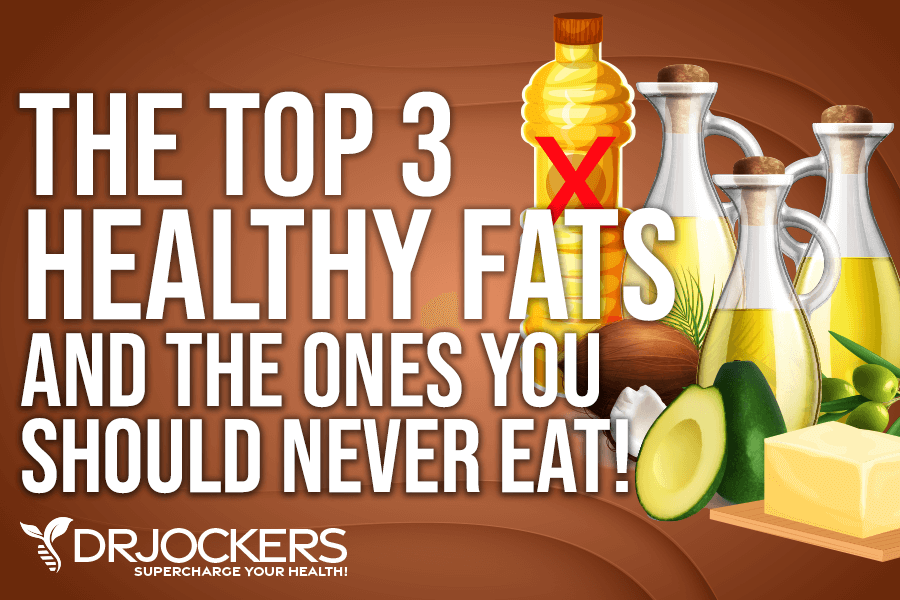 Healthy Fats Vs. Toxic Fats
Healthy Fats Vs. Toxic Fats
Healthy fats are essential for good health. However, some fats can be extremely unhealthy. When incorporating fats into your diet, it is important to distinguish between healing fats and toxic fats. Healing fats are nutritious fats that are anti-inflammatory and provide the body with energy and building blocks for various tissues.
Toxic fats are highly inflammatory and can contribute to a series of health problems. Learning which fats to avoid and what healthy fats to include in your diet may be one of the most important dietary strategies you implement into your life.
This article will discuss the best sources of healing fats and expose the toxic fats that are damaging to your health. It will also give ideas for incorporating healing fats into your diet and lifestyle, and tips for removing toxic fats from your life. First, the truth about fat will be uncovered.
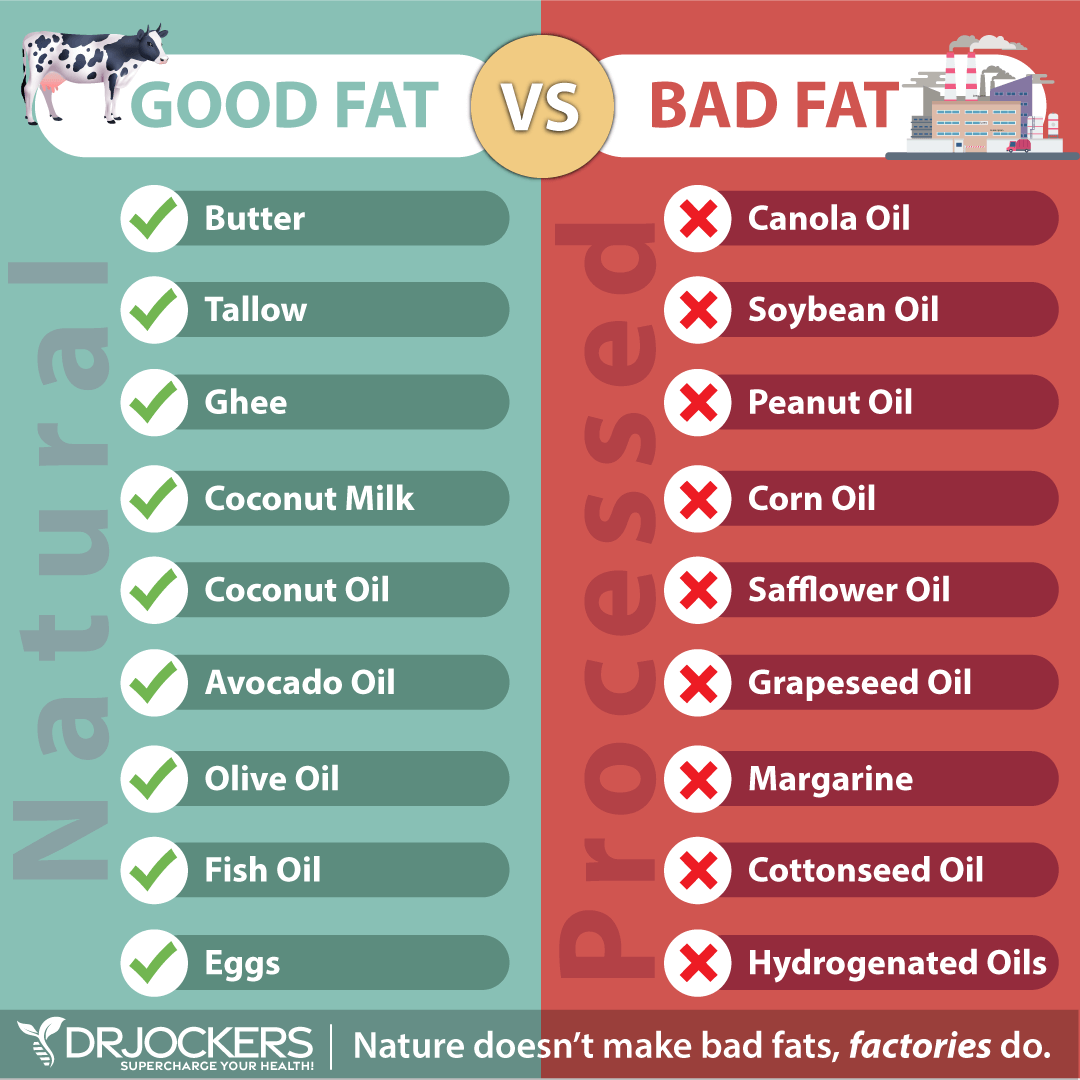
The Truth About Fat
Fat came under scrutiny in the 1960s when the sugar industry paid Harvard researchers to publish a review on sugar, fat, and heart disease. The sugar industry funded the research to cover up warning signs, which emerged in the 1950s, that sugar caused heart disease (1). Shifting the blame away from sugar, the researchers singled out saturated fat as the cause of heart disease.
In the decades following the Harvard study, the media, public health authorities, and the food industry promoted the low-fat, high-carbohydrate diet. This misleading nutrition advice was touted as the healthiest diet to prevent heart disease.
Food manufacturers flooded the market with processed foods containing hydrogenated fats and processed sugar. The replacement of saturated fats in the diet with trans fats and sugar resulted in epidemic rates of obesity and its related health complications (2). Rates of diabetes, heart disease, and cancer have risen since Americans adopted the low-fat, high-carbohydrate diet.
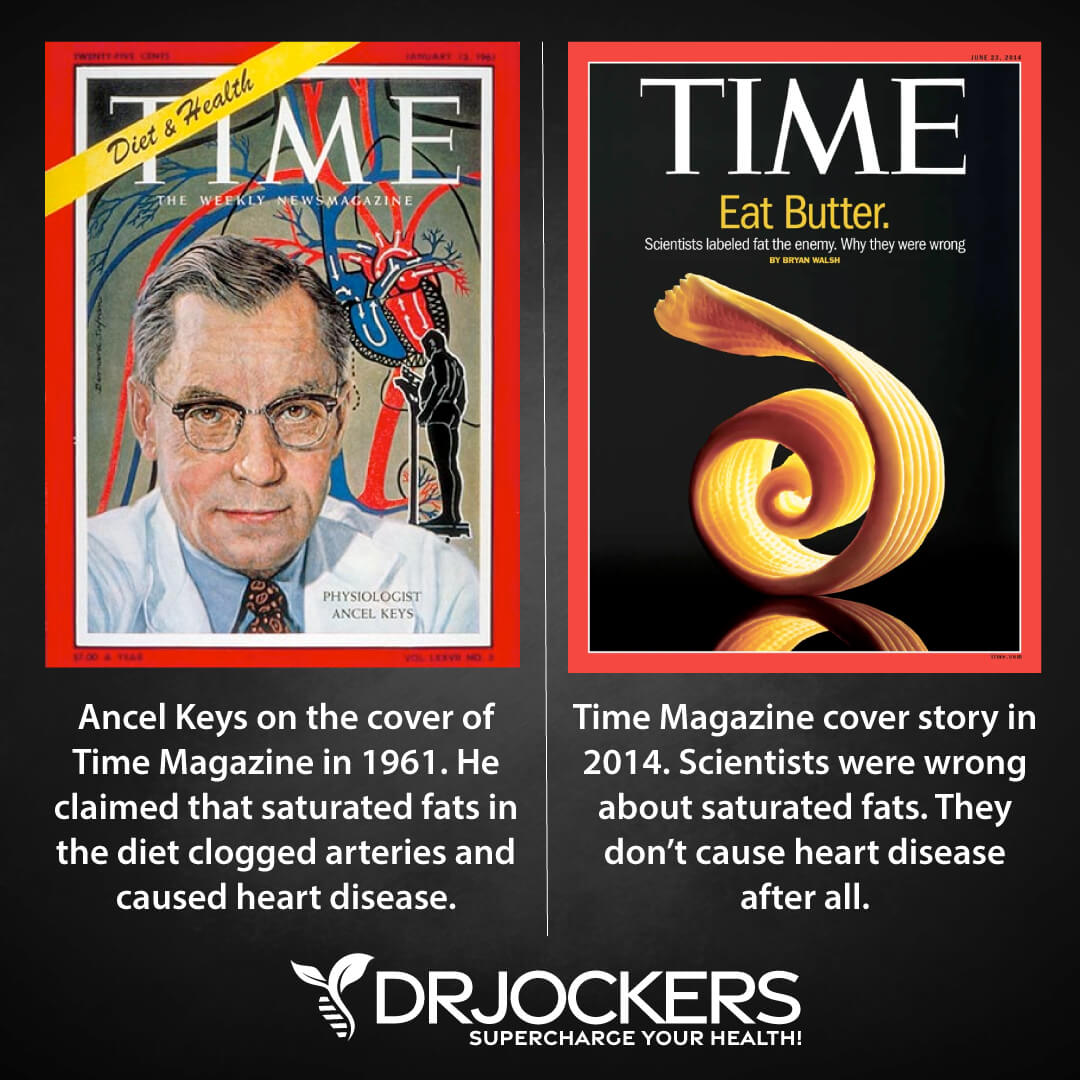
Corporate Influence
These ideas that saturated fats are unhealthy still seem to reemerge today. For example, the American Heart Association recently made a statement claiming that dietary fats and cholesterol are unhealthy and should be replaced with processed vegetable oils and sugars. Here is my take on that.
Consequently, much of the funding for the American Heart Association comes from corporations that produce and sell high amounts of processed foods.
Fortunately, the truth about fat has been uncovered in recent years. Science is continually confirming the benefits of incorporating healthy fats into the diet. Healthy dietary fats can help people lose weight, reduce inflammation, boost energy, improve brain health, and extend lifespan.
Fat Research
Two recent studies completely debunked the arguments for a low-fat, high-carb diet. In an August 2017 study published in the Lancet, scientists concluded “a high carbohydrate intake was associated with an adverse impact on total mortality, whereas fats, including saturated and unsaturated fatty acids, were associated with lower risk of total mortality and stroke. We did not observe any detrimental effect of fat intakes on cardiovascular disease events” (3).
A September 5, 2017, study agreed, finding that a high-fat, low-carb ketogenic diet extends longevity and promotes health (4).
Other studies have confirmed the health benefits of following a low-carb diet rather than a low-fat diet. In one study, women lost more weight following a low-carbohydrate diet than a low-fat diet (5). In addition to weight loss, studies also show that low-carb, high-fat diets reduce inflammation, regulate blood sugar levels, and reduce triglycerides while raising HDL cholesterol levels (6,7).
For fats to provide these health benefits, you must incorporate healing fats, rather than killer fats, into the diet. To do this, you must first be able to identify healing fats and killer fats. It is also important to distinguish saturated and unsaturated fats, non-animal fats and animal fats, and fats for hot uses and fats for cold uses.
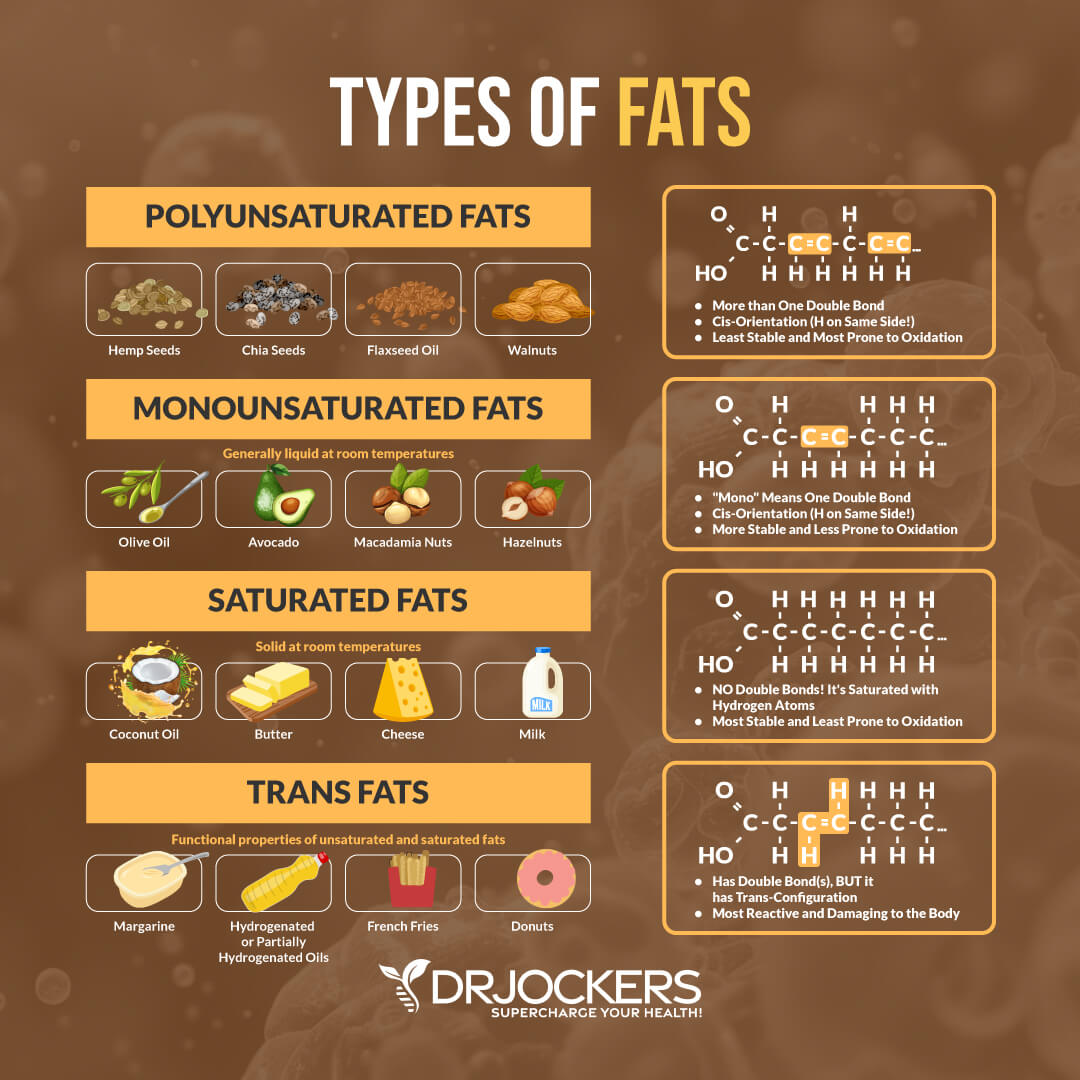
Healthy Fats
Healthy fats can be found in many sources. Healing non-animal fats are in avocados and avocado oil, nuts and nut butters, coconut, coconut milk, and coconut oil, and olives and olive oil. Healing animal fats are found in grass-fed butter, ghee, and dairy, grass-fed meats, organic, pastured chicken, and egg yolks.
Incorporating healing fats into your diet has many health benefits. Healing fats provide building blocks for cell membranes and hormones. They also function as carriers for important fat-soluble vitamins such as vitamins A, D, E, and K, and aid in the absorption of minerals. Healing fats are essential for a healthy body and lifestyle. Let’s look more closely at several healing fats.
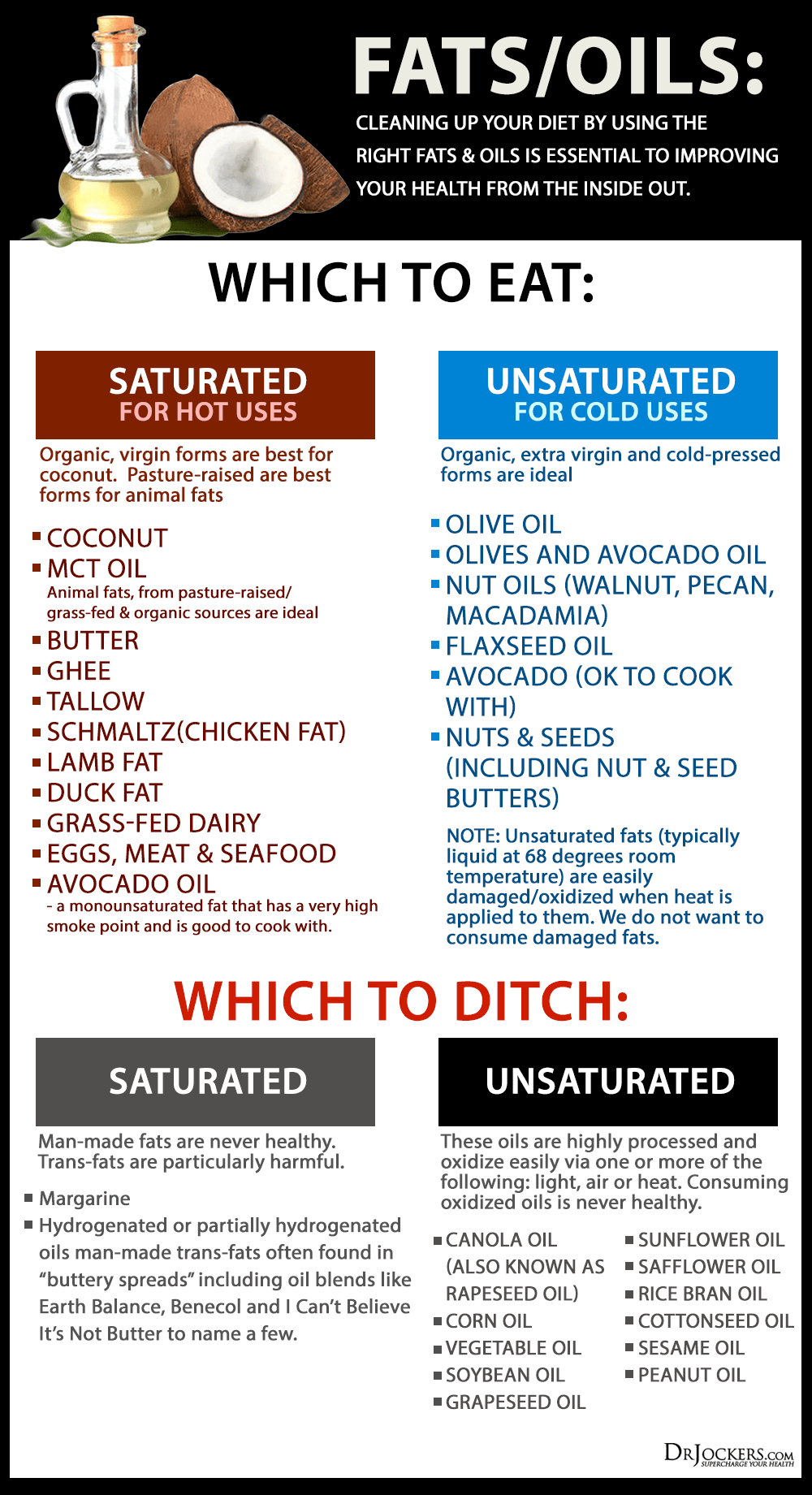 Omega 3 Healthy Fats
Omega 3 Healthy Fats
Omega-3 fatty acids are polyunsaturated fats found in fatty fish such as salmon and sardines. They are also found in walnuts and some seeds, such as chia seeds. They are liquid at room temperature.
Omega-3 fatty acids promote health in several ways. They reduce inflammation and lower the risk of chronic diseases, including heart disease, cancer, and arthritis. Omega-3 fatty acids can help lower triglycerides and apoproteins (markers of diabetes), and raise HDL (“good” cholesterol) levels (8). Omega-3 fats are also essential for brain and eye health (9).
When in the correct balance with omega-3 fats, omega-6 fats are healing fats. Like omega-3 fatty acids, omega-6 fatty acids are polyunsaturated fats. There are healthy and unhealthy sources of omega-6 fats. Healthy sources include sunflower seeds, wheat germ, sesame seeds, and walnuts. When eaten in the ideal ratio with omega-3 fats (between 4:1 and 1:1), these omega-6 fats promote health.
Unfortunately, most Americans follow the Standard American Diet (SAD) and consume a much larger amount of oxidized omega-6 fatty acids found in corn and soybeans than omega-3 fatty acids. This is detrimental to health because an excessive omega-6 level can lead to chronic inflammation, which is a cause of many health problems (8).
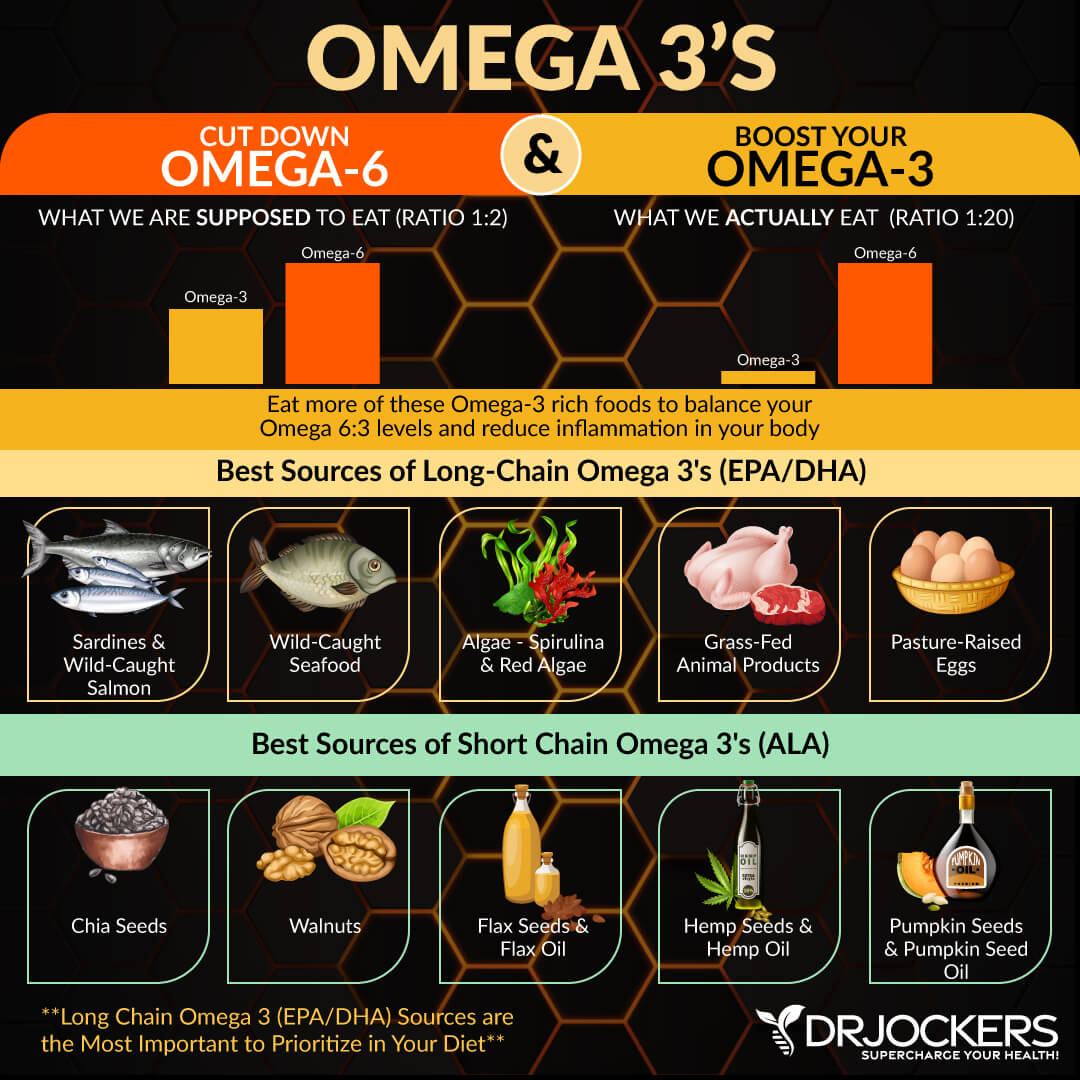
Monounsaturated Healthy Fats
Foods rich in monounsaturated fatty acids include olives and olive oil, nuts and nut butters, and avocados and avocado oil. Monounsaturated fats are liquid at room temperature, but start to harden when chilled.
Consuming monounsaturated fatty acids may protect you from heart disease by lowering LDL and total cholesterol, improving the function of blood vessels, helping prevent depression, improving body composition, and improving insulin sensitivity and blood sugar control (10,11). Monounsaturated fats have even been shown to reduce cancer risk (12). Oils rich in monounsaturated fats also contain the antioxidant vitamin E, which has many health benefits.
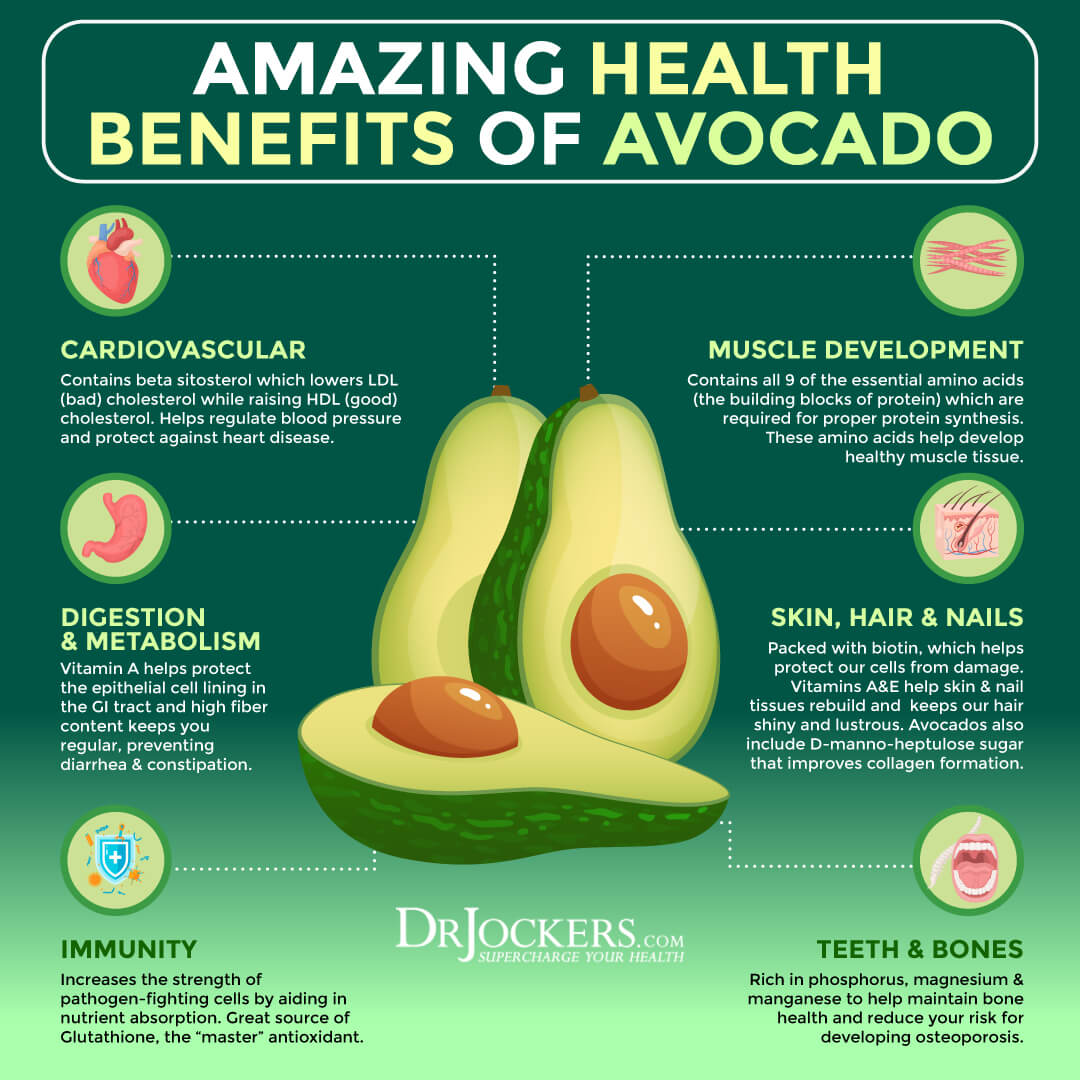
Saturated Healthy Fats
Saturated fats are solid at room temperature. They are found in animal fats such as grass-fed beef and dairy, and in coconut, palm, and MCT oil.
Saturated fatty acids constitute at least 50% of our cell walls and offer protection against unwanted materials invading the structural integrity of the cell wall. Saturated fats promote bone health by helping to utilize calcium. Saturated fats also protect the liver from toxicity, help fight off fungal and other infections, and boost our immune systems.
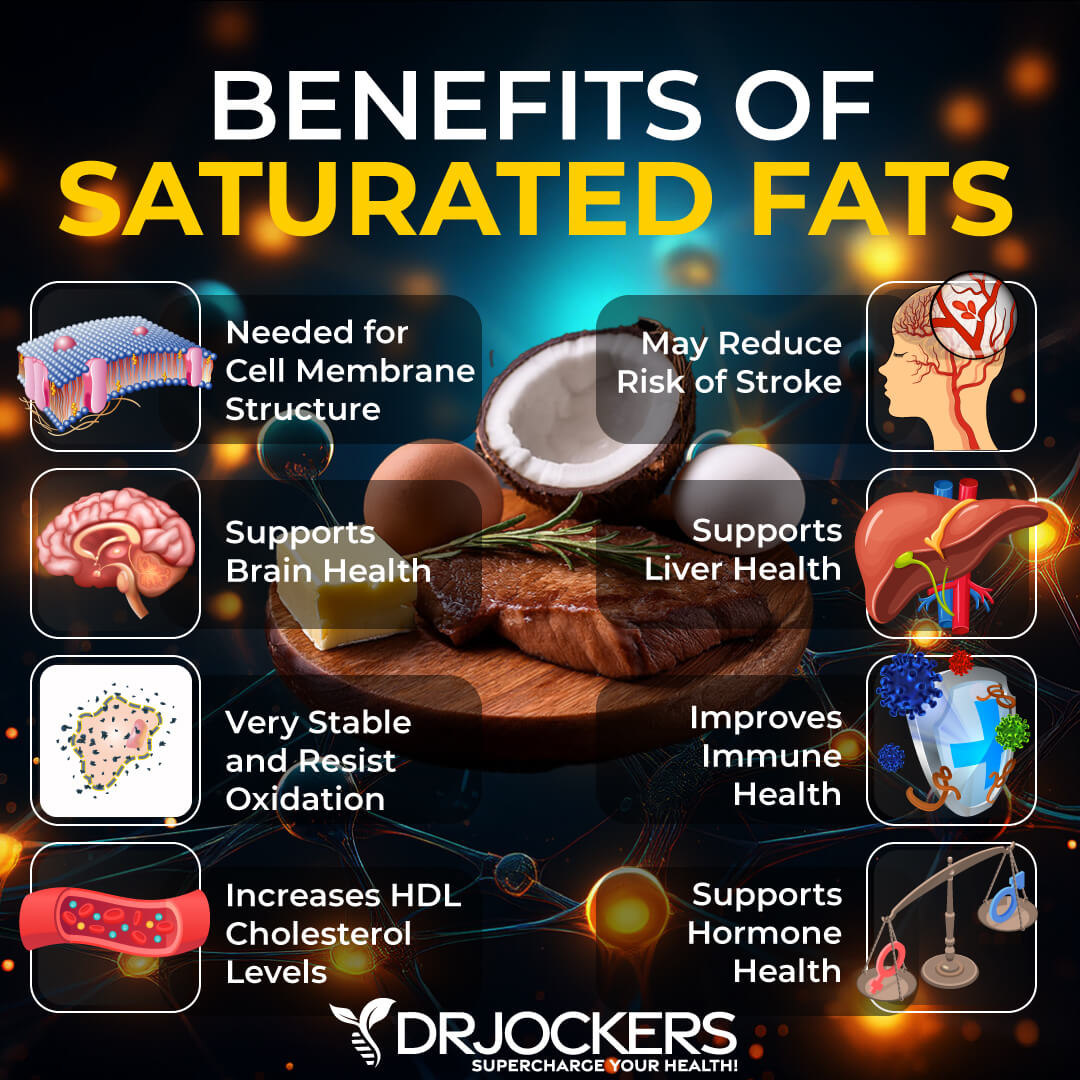
Sources of Saturated Fat
There are many great sources of saturated animal fats. Grass-fed beef and dairy (including cheese, butter, and ghee) and organic, pasture-raised chicken (meat and eggs) are excellent sources and increasingly available in grocery stores.
Grass-fed beef and dairy are rich in a number of nutrients, including omega-3 fatty acids, CLA, healthy proteins, vitamin E, B12, thiamine, riboflavin, creatine, iron, and zinc.
Coconut oil is an amazing healing fat. It has numerous health benefits, including aiding digestion, strengthening the immune system, preventing and fighting candida and other infections, balancing blood sugar levels, nourishing the skin and hair, and improving bone health.
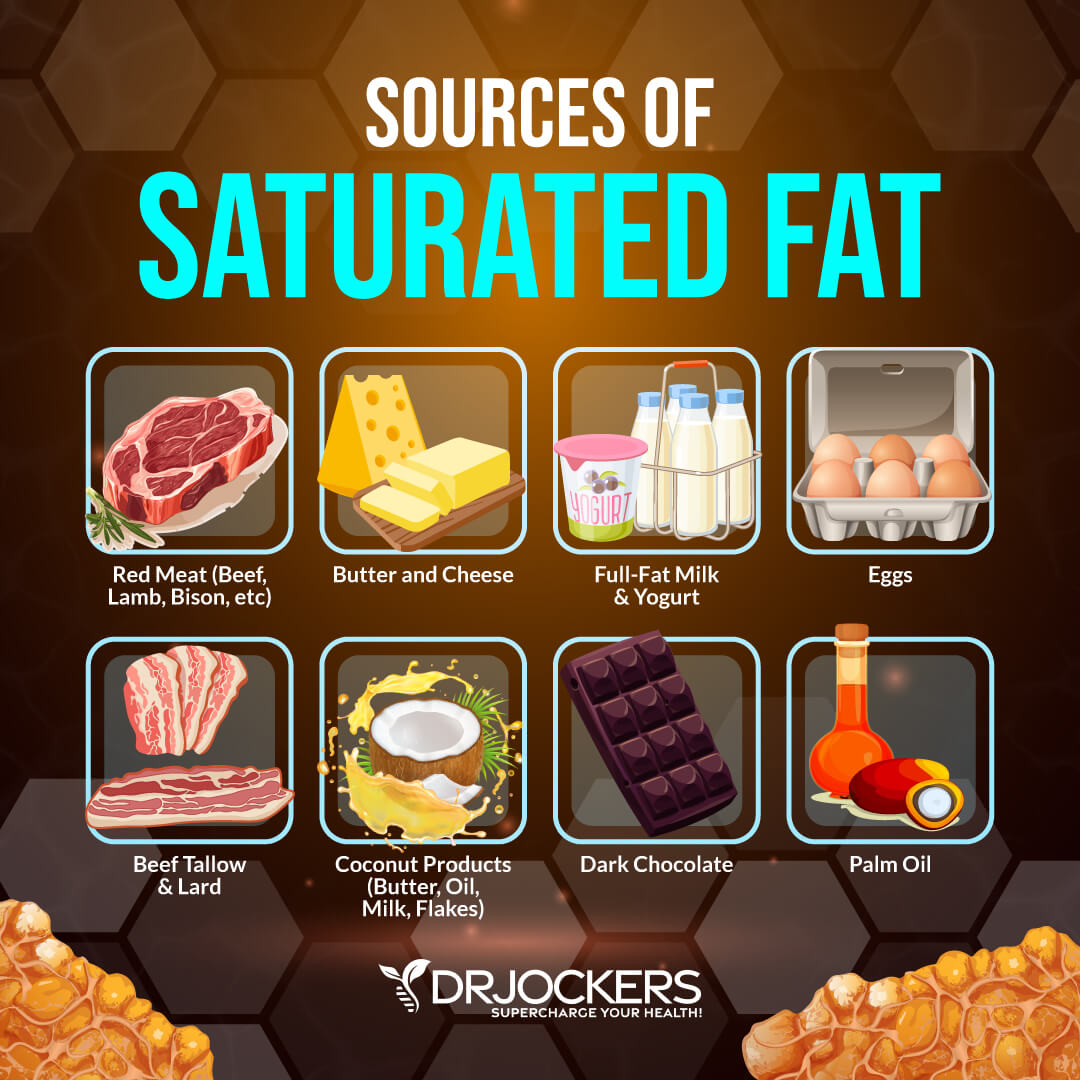
How to Use Healthy Fats
Cooking
The best way to use fats that heal is to buy and prepare your own food, incorporating these fats into every meal. You can incorporate these fats by choosing protein sources high in healing fats, cooking with healing oils and fats, and adding healing fats to your vegetables, salads, smoothies, and snacks.
Choose grass-fed beef, organic chicken, or wild caught salmon for dinner. Have a bison or beef burger with a lettuce wrap. Top it with sliced avocado and melted grass-fed cheese. For side dishes, try steamed vegetables coated in grass-fed butter or olive oil. Remember, those healthy fats help you absorb the vitamins and minerals in the vegetables.
The oils you cook with are a great way to incorporate healthy fats. For high-heat cooking, coconut and avocado oils are best because they have a higher smoke point, the temperature at which the fat or oil begins to break down due to heat. Avocado oil has the highest smoke point (570 degrees). The smoke point of ghee is 485 degrees, and extra virgin coconut oil is 350 degrees.
Although avocado oil has a smoke point, some of the valuable antioxidants are lost when heated. For this reason, I prefer cooking with coconut oil and tallow at high temperatures and will often drizzle avocado oil over my food after it is cooked.

Dressing & Cold Use
Extra virgin olive oil is the healthiest form of olive oil and has the richest flavor. It is made without any heat or chemicals and has a low smoke point. Because of its low smoke point, extra virgin olive oil is best used drizzled over cooked or raw foods or as a salad dressing. To give the salad a nutrition boost, top it with healthy fats from olives, avocado, grass-fed cheese, and nuts.
Healthy fats are easy to incorporate into snacks or appetizers. Guacamole served with sliced raw vegetables is one of the healthiest appetizers/snacks you can have. Walnuts and other nuts are delicious and crunchy. Nut butters are wonderful with celery sticks and other crunchy, raw vegetables. You can also top sliced granny smith apples with nut butters or layer slices of apples with slices of grass-fed cheese. Grass-fed cheese is also delicious with olives and is very satisfying.
Healthy Fats Bonus Strategy
Another excellent way to add healing fats to your diet is to include them in smoothies. Healing fats that are delicious in smoothies include avocados, flax and chia seeds, coconut or MCT oil, and nuts or nut butters. You can also use full-fat coconut milk as a great base for smoothies.
For example, one of my favorite ways to include more healthy fats in my diet is to make Turmeric Golden Milk or a Bone Broth Hot Chocolate. Begin with half a can of full-fat coconut milk and dilute with water to your desired volume. Heat the coconut milk on the stove to desired warmth.
For the Golden Milk, add in a scoop of Vanilla Bone Broth Protein, 1/2 Tsp of turmeric, a pinch of black pepper, and anything else you would like (cinnamon, ginger, MCT oil, etc.).
For a Bone Broth Hot Chocolate, simply combine the coconut milk with a scoop of Chocolate Bone Broth Protein. Again, from here you can add any other spices or superfoods as you wish.
Get creative with it! We have tons of recipes that show you how to incorporate healthy fats into your diet on a daily basis.
Toxic Fats
The most common sources of unhealthy fats are man-made saturated fats and highly processed unsaturated fats. Man-made saturated fats, including trans fats, are extremely harmful. Unsaturated processed oils, such as vegetable oil, canola oil and corn oil, oxidize easily and are never healthy.
Ironically, these are the types of fats that are often in processed foods like margarine and marketed as heart-healthy alternatives. These fats are not only highly inflammatory, but also offer zero benefits to the human body. On top of that, they come from factory farms that are extremely detrimental to the environment.
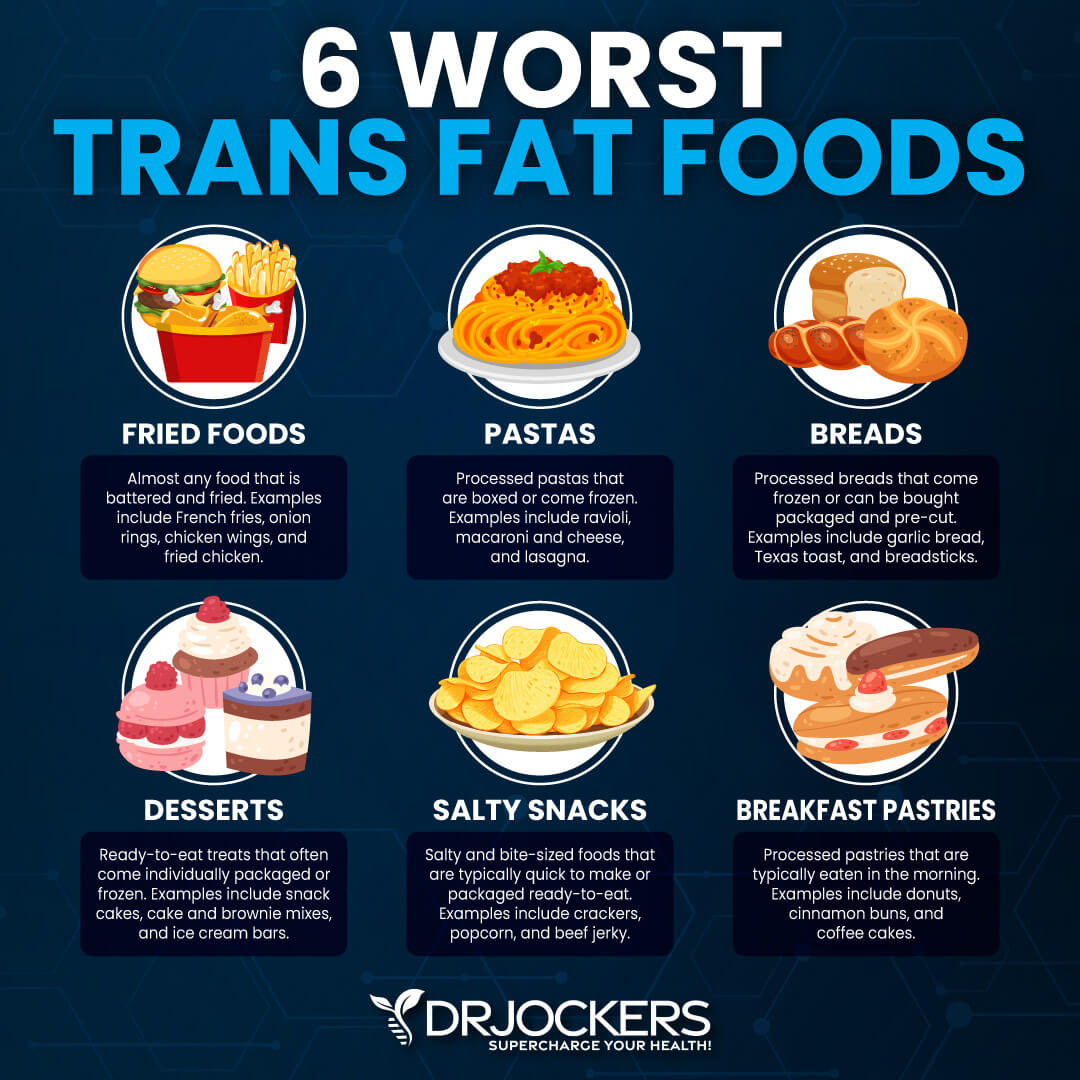
Hydrogenated and Partially-Hydrogenated Fats
Hydrogenated and partially-hydrogenated (trans) fats top the list of toxic fats. Hydrogenation is a process that turns polyunsaturates, which are normally liquid at room temperature, into fats that are solid at room temperature. Common hydrogenated fats include hydrogenated or partially hydrogenated cottonseed, palm, soy, and corn oils.
Margarine and shortening are two hydrogenated fats. Manufacturers use cheap oils, such as soy, corn, and canola, to create margarine and shortening. The new soft margarine or tub spreads, while lower in hydrogenated fats, are still produced from rancid vegetable oils and contain many additives.
Consumption of hydrogenated and partially-hydrogenated fats is associated with cancer, atherosclerosis, diabetes, obesity, immune system dysfunction, low- birth-weight babies, birth defects, decreased visual acuity, sterility, difficulty in lactation and problems with bones and tendons (13). It has also been shown to increase the risk of depression (14).
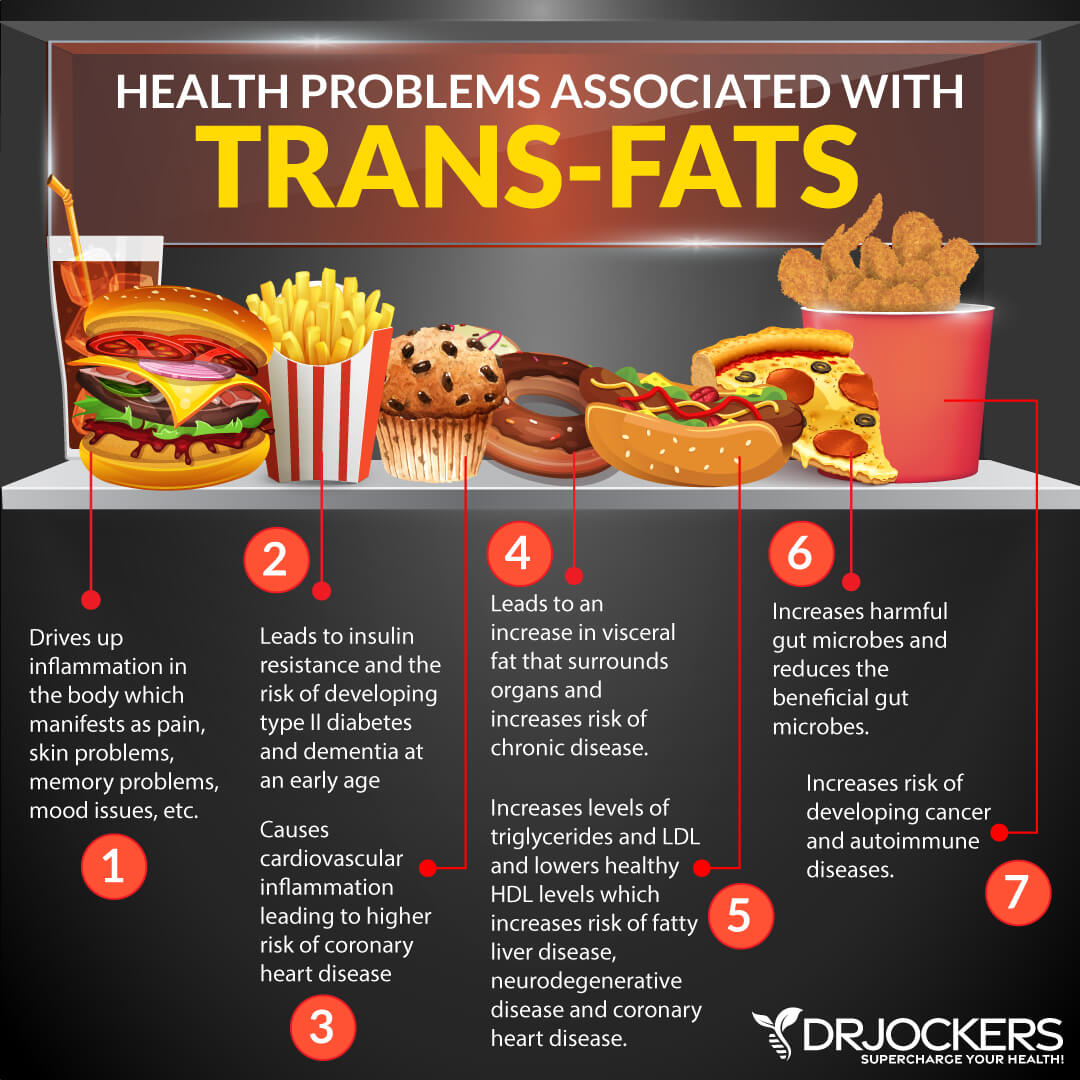
Processed Vegetable Oils
Most oils sold in the U.S. are refined vegetable oils which are highly processed and oxidize easily. These oils include canola oil, corn oil, vegetable oil, grapeseed oil, soybean oil, sunflower oil, safflower oil, rice bran oil, cottonseed oil, sesame oil, and peanut oil.
Oxidation occurs when oils are exposed to light, air, or heat. Oxidation promotes free radicals, chemicals that are highly reactive and have the potential to damage cells, including damage that may lead to cancer.
Additionally, over 90% of soy, corn, cotton (seed), and canola grown in the US are GMO. Olive oil is not a GMO oil. However, some restaurants blend olive oil with cheaper oil, such as canola oil. There are serious health risks associated with GMO foods, including immune system malfunction, accelerated aging, changes in the gastrointestinal system (leaky gut), and faulty insulin regulation.
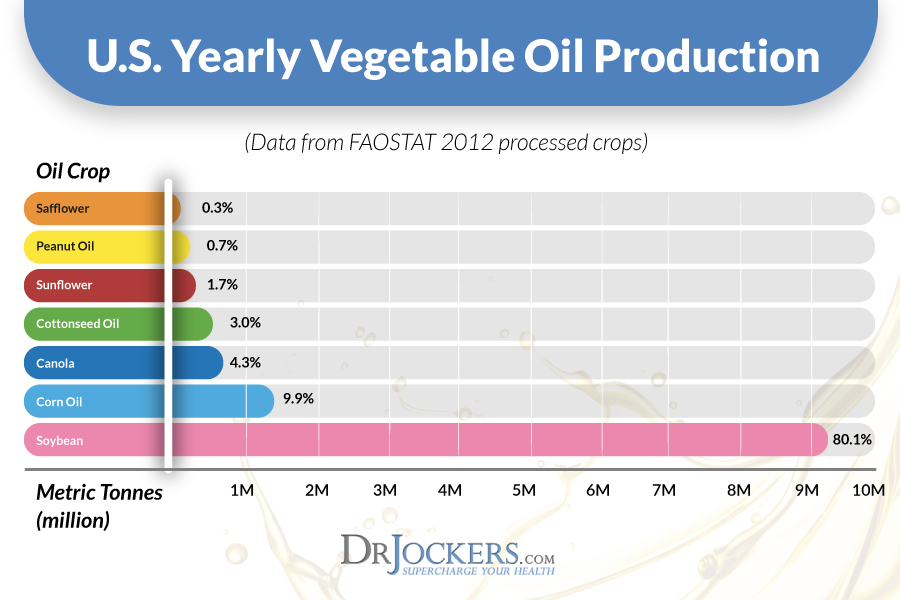
How to Avoid Bad Fats at Restaurants
Over 90% of restaurants cook with toxic oils. The best way to avoid these oils is to cook fresh food at home using the suggestions above.
If you are going out for dinner, be sure to ask your server what type of oil they use to cook. You can ask for steamed vegetables and melt butter or drizzle olive oil over them to maximize nutrient absorption and provide delicious flavor. Stay away from premade dressings and sauces, which usually contain oxidized oils and added sugar.
Avoid deep-fried foods such as French fries and fried chicken. Oils with trans fats are usually used in the cooking process because they do not have to be changed as often.
Avoiding Trans Fats
Avoiding trans fats can be tricky because food labels can be misleading. Even though trans fats have been banned by the FDA, foods with less than 0.5 grams of trans fat in a serving can read 0 grams of trans fat on the food label. To determine if the food contains trans fats, check the ingredient list for “hydrogenated” or “partially-hydrogenated” oil. While 0.5 grams may seem small, eating several portions of foods containing some trans fat may be enough to affect your health.
Trans fats are mostly found in processed foods. Unfortunately, processed foods make up a large percentage of American diets because they are convenient. But convenience is not worth the health consequences. Almost all processed foods contain trans fats and GMOs and should be avoided.
Processed foods that are likely to contain trans fats include snack foods and baked goods, such as chips, popcorn, cakes, and cookies. Ready-made frosting and refrigerated doughs (canned biscuits and cinnamon rolls) can also be sources of trans fat as well as frozen pizzas and pie crusts.
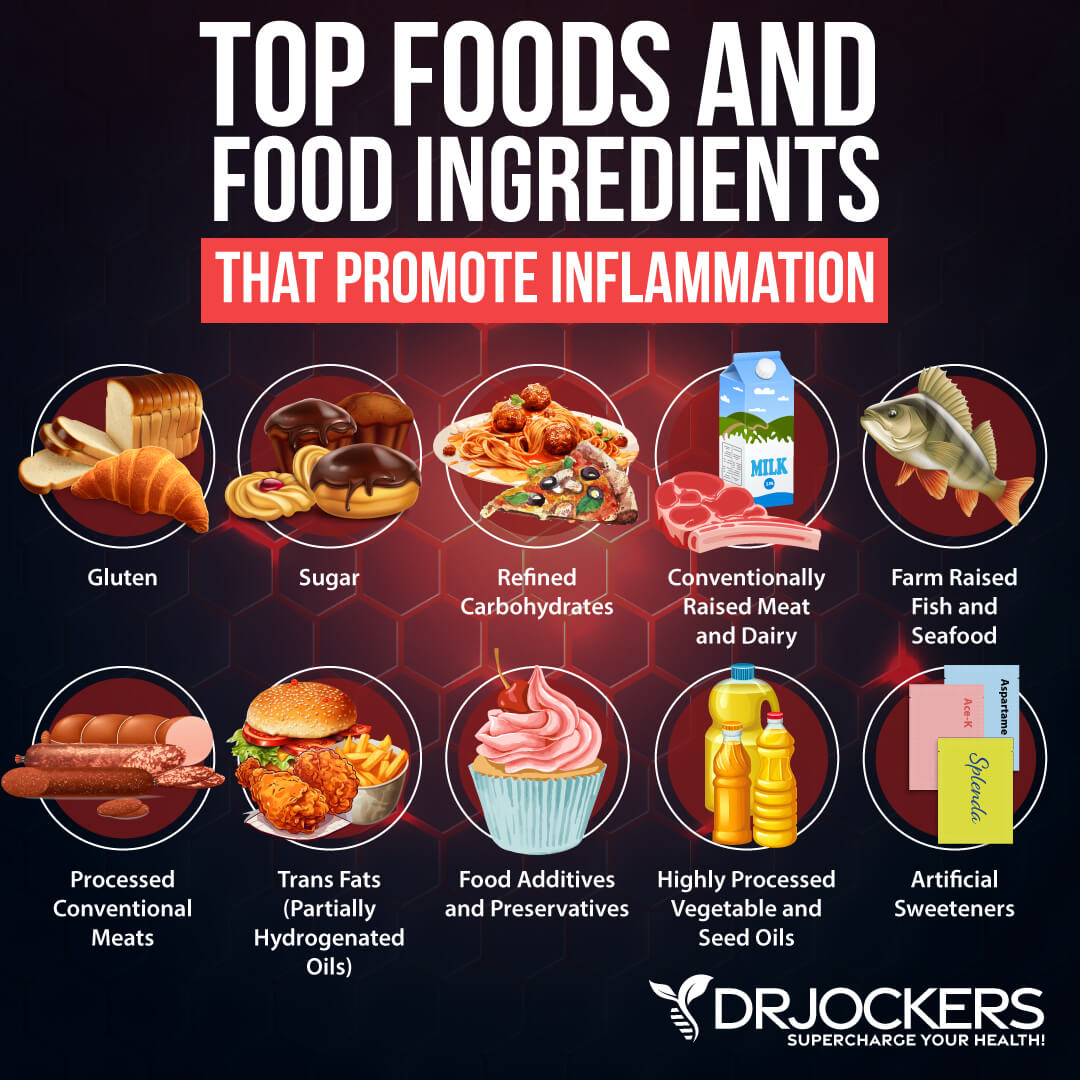
Conclusion on Healthy Fats
Dietary fat is essential for health and well-being. The key is to consume healthy fats and avoid toxic fats. Healthy fats include coconut and MCT oil, and animal fats from grass-fed and organic sources. Other healthy fats are in avocados and avocado oil, coconut and coconut oil, olives and olive oil, and nuts and seeds and their butters.
To incorporate healthy fats into your diet, you should cook with healing oils and fats, consume proteins that have healing fats, and add healthy fats to vegetables, smoothies, and snacks.
Toxic fats are hydrogenated oils and trans fats. Margarine, shortening, and other man-made oils are particularly harmful. Other toxic fats include canola, corn, vegetable, soybean, cottonseed, safflower and other oils that are highly processed and oxidize easily.
To avoid toxic fats, you must read nutrition labels carefully. You must also avoid all processed and fried foods as these usually contain hydrogenated oils. Choose real, grass-fed butter or ghee over margarine and spreads.
It is critical for good health to incorporate healthy fats into your diet and to avoid toxic fats. With the ideas in this article, choosing and eating the right fats will be much easier.
Inflammation Crushing Ebundle
The Inflammation Crushing Ebundle is designed to help you improve your brain, liver, immune system and discover the healing strategies, foods and recipes to burn fat, reduce inflammation and Thrive in Life!
As a doctor of natural medicine, I have spent the past 20 years studying the best healing strategies and worked with hundreds of coaching clients, helping them overcome chronic health conditions and optimize their overall health.
In our Inflammation Crushing Ebundle, I have put together my very best strategies to reduce inflammation and optimize your healing potential. Take a look at what you will get inside these valuable guides below!
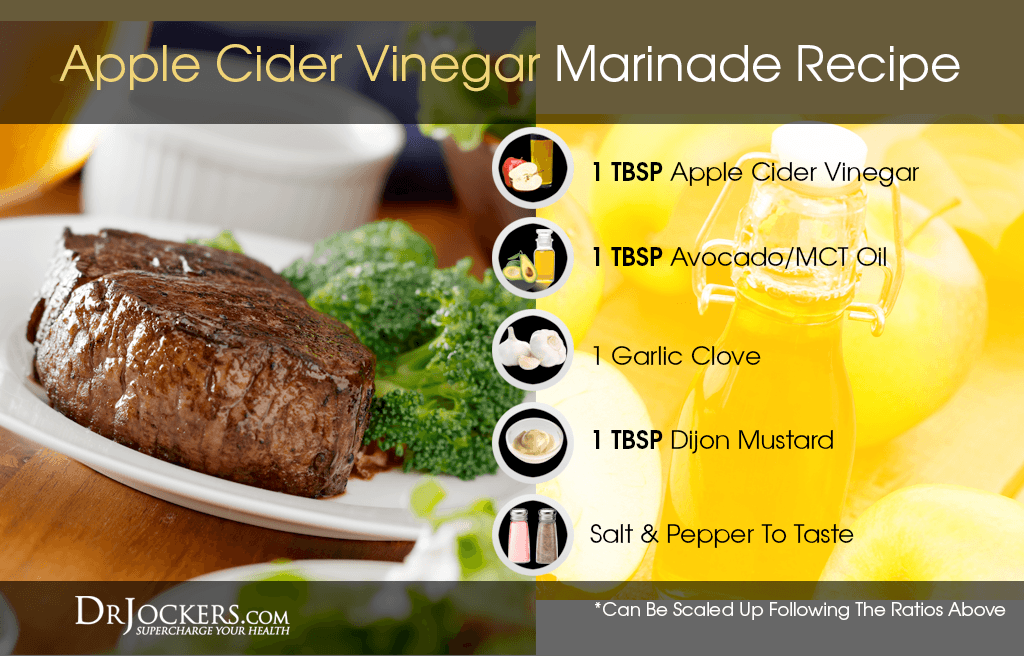


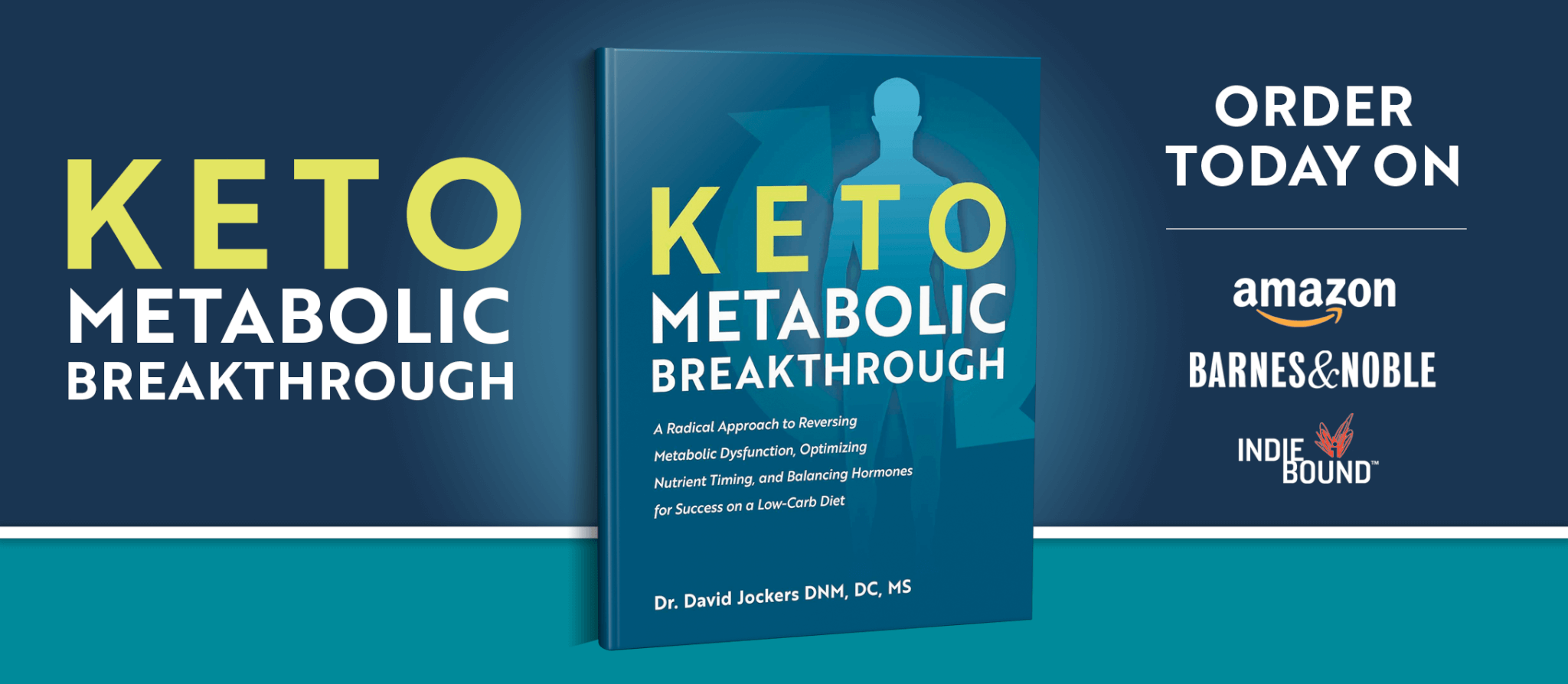




Both avocado oil and rice bran oil have a higher smoke point than avocado oil.
Why are they not included in the oils that are ok to use for cooking?
because the person who wrote this article is bought out by the meat industry
Not sure what you are talking about Jack but we don’t have any sponsors for our content. We certainly aren’t “bought out” by anything. Smoke point is not a reliable reference to cooking oils. Saturated fats are the most stable fats and will not combust under high heat. You do not want to cook with mono and poly’s. Mono and polyunsaturated fats do combust. Avocado oil and rice bran oil are low in saturated and high in mono and polyunsaturated fats.
As far as have studied Sat. fats are Bad for you !!!!
Hi Theresa, Good saturated fats can boost thyroid functional, improve metabolism and are essential to healthy cell membranes among other benefits. Coconut and eggs are great examples. Read this article for more information about the myth of saturated fats and health: https://drjockers.com/cholesterol/
“I didn’t mean to become a vegan douche but yet here I am.” – Jack Kenney
Both my certified nutrition & dietitian friend don’t like this article, what are you licensed in?
Yes unfortunately most nutritionists are taught by the ADA which is sponsored by big food companies and big agriculture and so they are brain washed to believe saturated fat is bad and polyunsaturated vegetable oils are good. They are taught that eating lots of whole grains is healthy. The worst nutrition advice ever!
Hi, and Thank you for a very interesting website. I read the newsletters with curiousity and I learn new things. I am a Norwegian woman who started with LCHF diet/ keto three months ago. My motivation was serious healthchallenges with IBS, which became increasingly difficult after an gut infection last summer. My gut is much better! Not “perfect”, but the difference from three months ago is huge. My energy level is also coming back to normal, and even better! I have a question about canola oil. I am confused. I thought it was healthy, and that the balance between omega 3 and 6 was good. Canola oil is a preferred oil, together with olive oil, coconut oil and butter, on dietdoctor.com and other lowcarb-websites and books. So I wonder, why is it in your opinion on the “not to eat” list? Is it something that happens with it during the process of production? Or? Kind Regards, Mona Sommer
Hey Mona, canola is often genetically modified and highly processed. It is a very unstable fat and oxidizes very easily after it is processed, making it highly inflammatory to the body. Also, it is high in omega 6 fats whereas most people need more omega 3 fats in the form of DHA and EPA.
Great article! I use olive oil to bake/roast but I set temp to 325. I hope that is ok. I love the Keto lifestyle and Dr Jockers you are a great source of information and inspiration. I loved your Docuseries
I love it Valerie! So happy you have found empowerment in this information!
Hemp Nuts need to be mentioned as a primary source of healthy fats.
Yes those are a good source as well!
Very good information but please clarify. In this presentation,in the chart, you show avocado oil under the unsaturated for cold uses category. But then later on, you say avocado oil is best for high heat cooking. Did I miss something? Thank you for clarifying!
Hey Pat, sorry for the confusion. It technically has a high smoke point so it can be okay for cooking. Avocado oil does contain valuable nutrients that may be damaged upon high heat so I personally use it for topping and dressing!
I had the same question. You include avocado oil in the “Cold use” category, and add a note not to heat it; yet the article then says, “For high-heat cooking, coconut and avocado oils are best.” Is it not to be used for cooking because heat damages it, is it “okay” for cooking as you mention in your answer, or is it “best” for cooking? To avoid the confusing contradiction, please clarify/correct in the article. Thank you!
Hi Lynn, The high smoke point for avocado oil makes it one of the better choices for high heat cooking. Although it does not oxidize as quickly as other oils do, valuable antioxidants can be lost when heated which is why I prefer to cook at high heats with tallow often. The same can be said for butter. Although it has a high smoke point and is good for cooking, I prefer to add butter to my food right after it is cooked so the cooking process doesn’t lose the beneficial nutrients. I hope that helps clarify the confusion!
I have been off and on keto for a while. I’m type 2 taking 1000mg of metformin. When I add oil to up my fat intake my eyes get puffy. Tried to find the reason. Any suggestions?
Can you explain why canned tomatoes are on the don’t eat list.😁
Tomatoes are very acidic and they pull aluminum and BPA out of the cans into the product. Best to get tomatoes in glass jars or fresh!
What about “sustainably sourced palm fruit oil”?
That is good as well although it is very high in long-chain saturated fats (as opposed to coconut oil which is higher in medium chain) and should always be combined with anti-oxidants (fruit, vegetables, herbs) to reduce bacterial endotoxin production which can come from a diet high in long-chain saturated fats. The red palm oil is best because it has natural polyphenols which are anti-microbial and support a healthy microbiome.
Thank you so much Dr. Jockers! Have a blessed day!